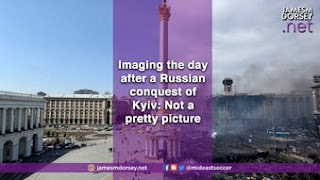Imaging the day after a Russian conquest of Kyiv: Not a pretty picture
By James M. Dorsey
It may be only a matter of time before Russian troops
control the Ukrainian capital of Kyiv and topple President Volodymyr Zelenskyy.
However, that may not be the end of the story. Russian
President Vladimir Putin’s troops could find themselves in Ukraine for the long
haul depending on whether Ukrainians have the stomach to launch an insurgency.
If so, Mr. Putin knows the drill. Soviet troops withdrew
from Afghanistan in 1989 after a costly decade-long war in which they battled a
US-Pakistani-Saudi-backed Islamic insurgency. Their defeat resembled the
humiliation suffered by the United States at the hands of the Vietcong in the
1970s and the Afghan Taliban with last year’s US withdrawal from the Central
Asian state.
As Ukrainians weigh their options for a post-Zelenskyy
era, Chechnya, rather than Afghanistan, will likely be on their minds. Russian
troops brutally quelled an Islamic insurgency in Chechnya in two wars. They
besieged and devastated the Chechen capital of Grozny.
Ukrainians may be right to focus on Chechnya. Their
country is not Afghanistan. It does not border on a country like Pakistan that
would be willing to invite the wrath of Russia.
NATO members Poland, Romania, Hungary, and Slovakia,
are unlikely to volunteer as Ukraine's Pakistan. NATO expects its buildup along
Russia's European frontiers to deter Mr. Putin from expanding his war beyond
Ukraine and is unlikely to want to give the Russian leader a blatant excuse. However,
that would not stop NATO members from supporting a Ukrainian insurgency
covertly.
Ukrainians may also look at Iraq as they consider
their options. That could be more problematic for Mr. Putin. Elements of the Iraqi army,
granted with the support of Iran and Syria, posed part of the backbone of the
costly fight against the US presence in the country following the 2003 US-led invasion.
Mr. Putin may have had that in mind when he this week called on the Ukrainian
military to seize power in their country in a bid to
avoid an even bloodier battle than the fighting so far, particularly in Kyiv.
If Mr. Putin is betting on the fact that the Ukrainian
military trained and armed itself to fight a conventional war like the Russian
invasion, he may want to think twice. Iraq would suggest otherwise.
That is undoubtedly what proponents of a
long-drawn-out insurgency believe.
“By combining serving military units with combat
veterans, reservists, territorial defense units, and large numbers of
volunteers, Ukraine can create tens of thousands of small and highly mobile
groups capable of attacking Russian forces. This will make it virtually impossible for the
Kremlin to establish any kind of administration
over occupied areas or secure its lines of supply,” said former Ukraine defense
minister Andriy Zagorodnyuk.
A poll conducted in December by the Kyiv International
Institute of Sociology suggested that one in three Ukrainians would be
willing to join an armed resistance against
Russian forces.
Politics scholar Olexiy Haran, said after earlier in
the day delivering food to defenders of Kyiv near his home, that volunteers led
by military and former officers had already established irregular fighting
units armed primarily with automatic weapons across the city.
“People are armed. Yesterday, 18,000 Kyivites took up
arms. There are volunteer groups all around the city. They pursue any Russian
soldier, paratrooper or subversive group that is trying to organize a
provocation,” Mr. Haran said.
Russia scholars Michael Kofman and Jeffrey Edmonds may
unwittingly have articulated Mr. Putin’s counter-argument and assumption when
they argued in a Foreign Affairs article
this week that a shift by the Ukrainian military from conventional to partisan
warfare “is easier in theory than in practice.”
Messrs. Kofman and Edmonds reasoned further that
partisan tactics would be less effective than past wars, presumably including
former Yugoslavia and Iraq.
“These tactics would be less effective than in
previous wars, thanks to the rise of new technologies, such as drones using
thermal cameras and cheap, high-resolution satellite imaging. Today, small
groups of fighters may struggle to hide and to win on the battlefield,” the two
scholars wrote.
The same would be true for insurgents, as evident with
Yemen's Houthis.
Ukrainians would further benefit from the fact that
Kyiv is not Grozny, and Ukraine is not Chechnya, where the world looked the
other way in part because Russia was fighting an Islamist and jihadist
insurgency. Mr. Putin’s assertion that he is fighting neo-Nazis and drug
dealers in Kyiv have little international currency.
Abkhazia, one of two Russian-supported territories
that broke away from Georgia in 2008, may be Mr. Putin's best-case scenario.
Abkhazia is wracked by political instability rather than insurgency and
violence.
Anti-government protesters
have demanded a halt to sales of real estate and energy assets to Russian nationals
and a notion of a “shared sovereignty” between Abkhazia and Ukraine. They also
denounced a proposed Russian-style law that would allow the government to label
non-governmental organizations (NGOs), public figures, and media as foreign
agents.
Abkhazia may be Ukraine’s least likely model, at least
for the near future.
Nevertheless, whatever Ukrainians decide, a Russian
occupation of Kyiv and replacement of Mr. Zelenskyy with a more Moscow-friendly
figure is likely to be the beginning rather than the end of the story.
To watch a video version of this story please
click here.
A podcast version is available on
Soundcloud, Itunes, Spotify, Stitcher, TuneIn, Spreaker, Pocket
Casts,
Tumblr,
Podbean,
Audecibel, Patreon,
and Castbox.
Dr. James M. Dorsey is an award-winning
journalist and scholar, a Senior Fellow at the National University of
Singapore’s Middle East Institute and Adjunct Senior Fellow at Nanyang Technological
University’s S. Rajaratnam School of International Studies, and the author of
the syndicated column and blog, The
Turbulent World of Middle East Soccer





Comments
Post a Comment